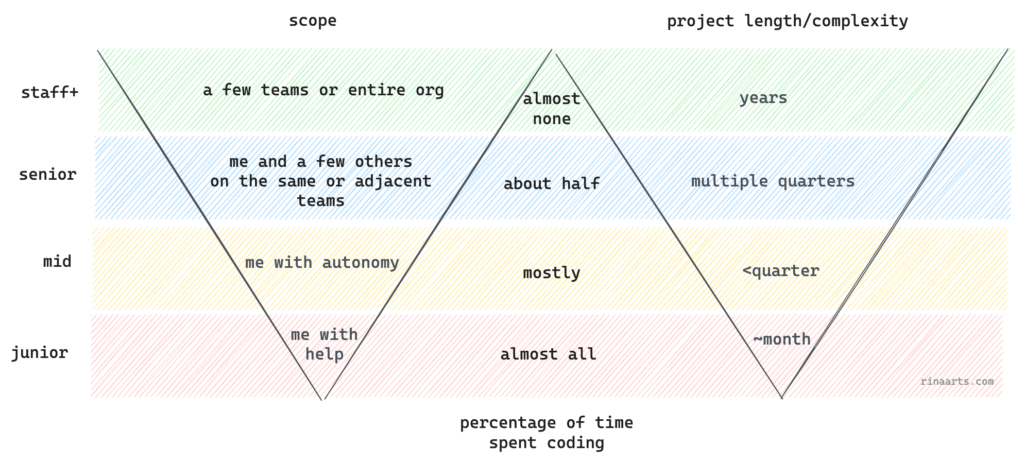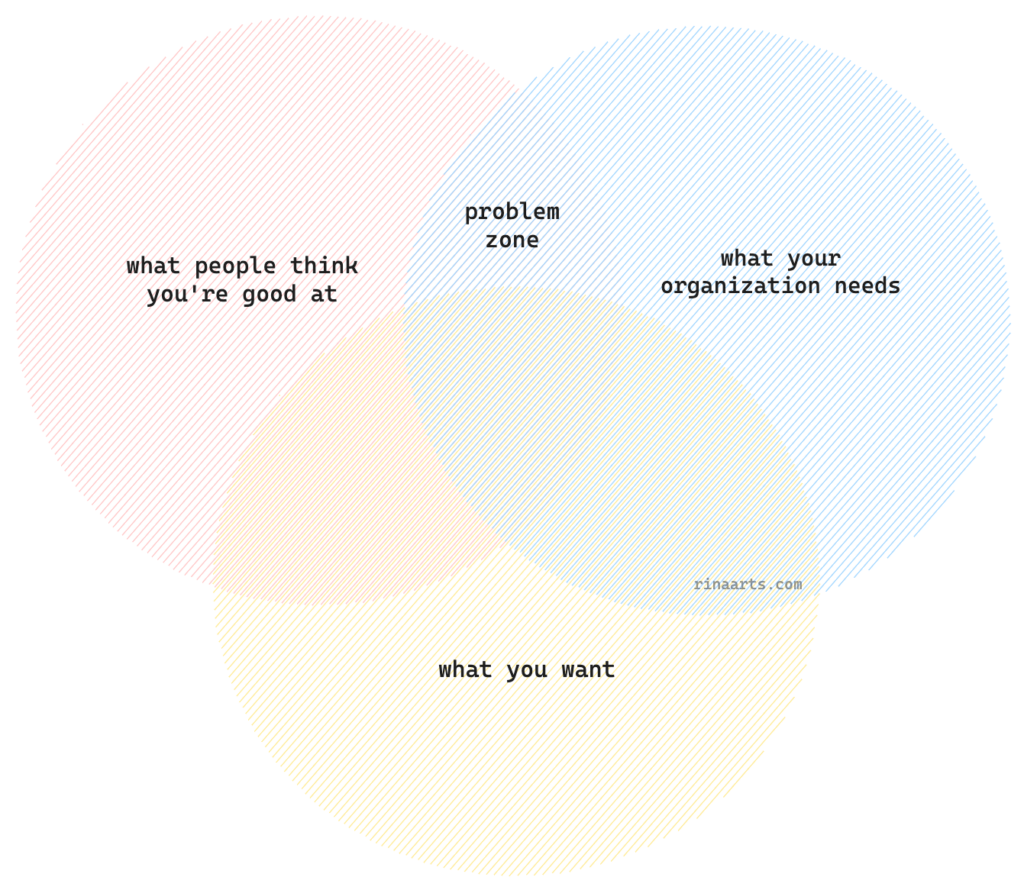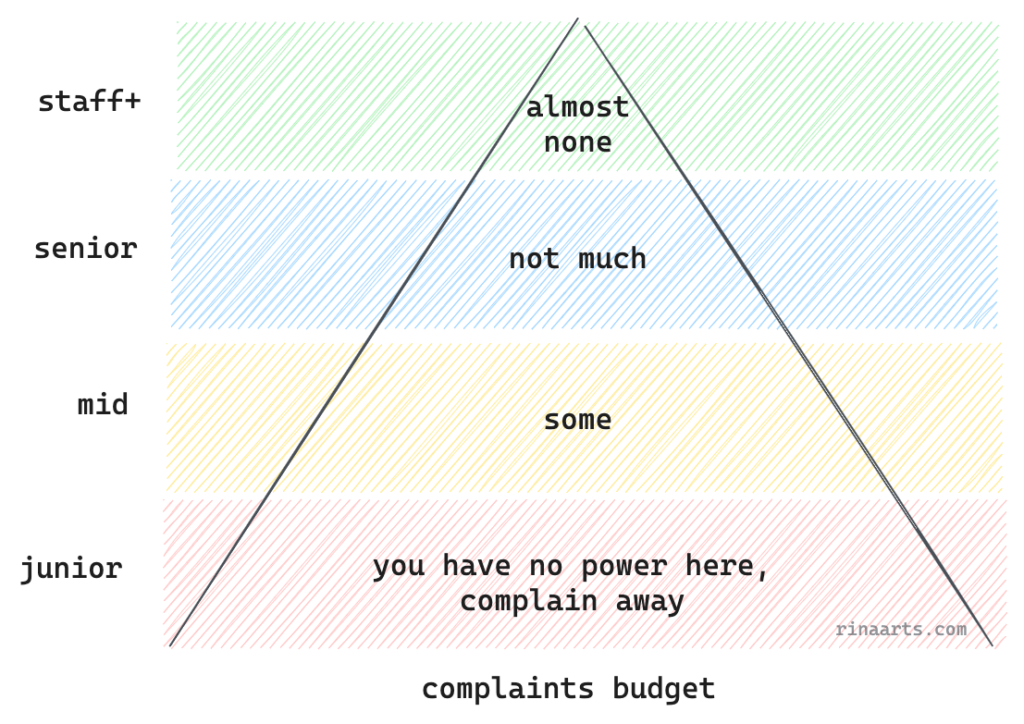First, I introduce myself: Hi, my name is Rina, I’ve been in the business of software for about 20 years in a variety of companies large and small, local and international. True to the time of this writing, for the last 6-7 years I’ve worked in American corps as a senior software engineer (SWE) and now tech lead. I had a short stint as a manager which is a fascinating story worth telling, but not today. I am also married with 3 kids.
Levels
Here’s a drawing I made because it felt right. It’s not all encompassing, but I use to provide a general outline of what different seniority levels really mean (at least in corp-type institutions).

Scope
On the scope axis we see that junior level SWEs are expected to work in a limited scope, basically themselves, with a lot of help and support. This is why most companies do not allow SWEs to stay at the junior level forever – it requires too much effort from those around them.
At the mid level a SWE is expected to manage their own tasks with not as much constant support. Some companies will allow you to stay at this level forever. You are productive, don’t require “babysitting” and in general contribute more to the output of a team then you cost.
At the senior level a SWE is expected to expand the scope of their responsibility to include leading a few other team members or perhaps a project which involves people from a few adjacent teams.
At the staff+ level you’re already dealing with several teams or a whole organization, at higher levels you are expected to influence outside your area.
Coding
As you become more senior, the percentage of time you spend on what we think of as SWE core tasks (writing code & designs) and more of your time goes to people stuff. We will come back to this point later on – it’s important.
There are several sets of internal presentations at Google about what is required to get to the next level but what I love most about the senior-to-staff presentations is they always include some kind of “ARE YOU SURE?”, because going from senior to staff is a totally different role. You will no longer be mostly coding, in fact you will do almost no coding (all the staff+ SWEs are constantly complaining about never having time to code, it’s endearing really). If you love writing code, perhaps that next promotion is not for you – you can stay a senior SWE forever and it will be awesome!
Project length/complexity
Project complexity cannot and should not be measured by length, but it’s often a useful proxy. As you go from junior to mid to senior to staff+ the length and complexity of the projects you work on will increase. This is natural, but it also means you will have less immediate satisfaction. Be prepared.
Getting to the next level
Look and listen
There are opportunities all around you to do something bigger, you just need to notice them. The easiest way to figure out what needs to be done is to listen to complaints. Every “someone needs to do something” is something someone can do something about. Ask yourself:
- Is this something important?
- Is this something I can do something about?
- Is this something I want to do something about?
- Is this something that will help my manager (or maybe their manager or someone else influential in the organization)?
- Is this something that will help me learn something new? Or showcase a skill I already have?
If you answered all or some of these questions with a “yes”, it’s worth exploring. If you want to be effective come to your manager with at least a beginning of a suggestion on what needs to be done and how, and why it makes sense for you to be the one do it. Managers like people who solve problems for them and don’t add to their existing mental load.
The higher up you go, the more you’re expected to be able to identify wider organizational issues without guidance, formulate a plan and convince stakeholders to support you. Your manager probably won’t be enough.
But beware:
Trap #1: Knowledge Management
STAY AWAY FROM KNOWLEDGE MANAGEMENT.
There is one thing people complain about all the time. Knowledge sharing and management – documentation, “what other teams are doing” etc. However, this is a known problem with no good solution. You are not the person who’s going to figure it out and do it well. What inevitably happens is a short term effort to document everything which will never be completed and get outdated so soon, so soon. Do yourself a favor and just don’t.
(If there’s any real-world problem that LLMs might be able to fix I’m betting on this one, actually. Time will tell).
Trap #2: Being Glue
In her iconic talk Being Glue, Tanya Reilley talks about the glue work trap, where too early in your career you start focusing on coordination work and “making things happen”. Sometimes, if you’re good at it and like that kind of work, and maybe see more senior folk doing that kind of thing and think it’s a good path for impact and promotion, you’ll get caught up in non-technical work.
This is a problem because if you look back at the drawing in the beginning of this post you’ll see what’s expected at the first few levels of your career is to mostly write code (and design documents). When you are seeking a promotion it’s hard to find the right balance between doing what’s expected from you and operating at the next level – but it’s essential that you build a good foundation of technical expertise before moving up to the next level. There will be plenty of time later in your career to complain about not having enough time to code.
More about this (and the next point, actually) in my blog post Follow the technical road (in high heels).
Trap #3: Going somewhere you didn’t want to go

You may have seen a similar Venn diagram depicting the Ikigai concept (tl;dr: your happy place is that thing that you love doing, are good at, and someone’s willing to pay you to do). In a sadly real world variation, sometimes what you’re perceived as being good at is not the one thing you’re really good at, and what you want doesn’t align with what the organization you work for needs. When this “problem zone” happens to you, you might be nudged into career paths you might not have chosen otherwise.
While this can happen to anyone, often women in technical roles will be gently pushed into product and management roles because they are lacking in role models and perceived as having better people skills but “not technical enough”.
While sometimes you can stumble into a career path you didn’t choose and find it suits you well, I recommend making this type of choice with deliberation, not because it happened to you without you noticing.
Trap #4: Complaints budget

Remember when I told you to listen to complaints? That’s great for other people, but the more senior you become the less you should complain. As your influence grows, you’re expected to identify problems and do something about them (yourself or by delegating).
Before complaining ask yourself the same questions you should ask yourself when hearing complaints, and if you answered all or most with a “no”, just don’t.
If the issue is important and very clearly not in your power to influence, you may complain, but use your “complaints budget” wisely and only for issues that really matter.
Trap #5: A whole lot of precious time
When you’re going for the next level, you will usually be required to demonstrate that you are capable of doing next level work. The trap is that you can’t usually stop doing your current level work. This means that you either have to work more to be able to do both or be so good at your current level of work it takes you less time to complete your current level tasks.

The first option will usually require working more hours in the shortish term (until you are promoted) and the second option will usually require a working over a longish term until you have developed that ease of expertise that (gives me star-eyes watching you work and) enables you to have the mental capacity and spare time to do other work. Either way it will require some dimension of time.
More about work-life balance and career choices in my blog post The Floor is Lava.
Conclusion
When I give this talk I elaborate more or less on these points, depends on the audience. Sometimes I forget some of them entirely or go off on a tangent – live talks are fun! And I have written a lot on this subject over the years (as the linked posts indicate, oh! here’s another one), go ahead a read more of my thoughts on the matter.
Anyway I hope this helps, have a great day!
